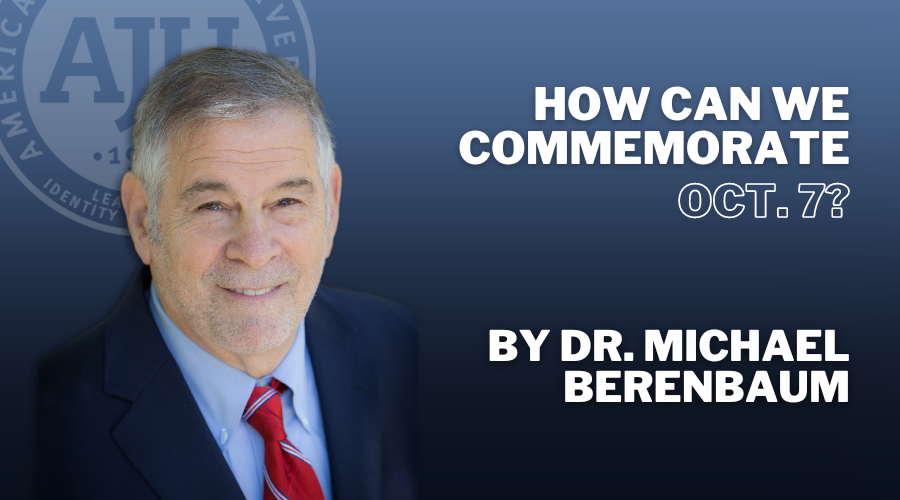
I have just returned from 10 days in Israel where I attended the funeral and sat shiva for my beloved sister. In the process I experienced a cross-current of Israelis struggling with the current situation and also the raging controversy surrounding how to commemorate Oct. 7.
As a person who has been involved in Holocaust commemorations for the past 45 years and has written on the politics of commemoration, I think I know a bit about both what must be commemorated and what to avoid in commemoration.
It is significant to note that no one in Israel is talking about commemorating the event on the Hebrew calendar, which coincides with Simchat Torah. The contradiction between the celebration of Simchat Torah and the catastrophe of what occurred on that day in the Jewish calendar — October 7 in the Gregorian Calendar — is just too great for anyone to imagine a commemoration in Jewish time. And even though no event in Jewish history has been remembered unless it endured in the Jewish calendar, it is too soon or it may never be possible that we remember these events in Jewish time, marked on the Jewish calendar.
There is a boiling controversy in Israel on how to observe this catastrophic anniversary. Kibbutzim and settlements in the south directly impacted by the Hamas pogroms and hostage-taking have withdrawn from participation in the government-sponsored commemoration. President of Israel Isaac Herzog has offered to host the event and to make it scrupulously non-political: not a rallying point for the government and its policies, not a protest point for those – seemingly the majority of Israelis – opposed to the conduct of the war and/or the failure to have a ceasefire that will free the hostages. The minister in charge of the commemoration has rejected his offer, a rejection that even the Jerusalem Post editors described as childish.
So a day that should unite Israel and bring the Jewish people together has divided Israel, fragmented Israel. The politics of war and the hostage negotiations, which divide Israel will be manifest in the conflicting commemorations.
What does that mean for the Los Angeles Jewish community?
Permit me to suggest the following.
- There should be one commemoration – this fragmented community should come together as it did on October 8, 2023 just as Simchat Torah ended in the diaspora.
- The commemoration must be scrupulously non-political — non-political in the American elections which will be held less than 30 days after October 7, and non-political in terms of the government of Israel. It should not be a rallying point for the prime minister. Equally important, it cannot be a focal point of demonstrations in Jewish opposition. There will be enough demonstrators outside the venue that we do not need them inside or have people walking out because of partisan political divides.
- There is enough to commemorate including the lives lost on October 7 and in the year since, the loss of Israel’s sense of security prevalent throughout Israel and the Jewish world today, the anguish of hostages still in captivity and the ordeal of their families and loved ones, the trauma of those hostages who have been released, the death of IDF soldiers and the existential crises facing Israel.
- Solidarity must be expressed with the people of Israel: the people not the government, the people not the policies, and most especially not the politicians.
Speakers will have to be restrained.
This cannot degenerate into a Trump rally, a Harris rally, a Biden rally, a Netanyahu rally. Memory and unity must be the theme of the day, loss and existential crises. Even when they grapple with antisemitism, as well they must, speakers cannot use the occasion to attack the right or the left, merely the venom and the hate.
Prayer and song can unite. There are magnificent laments that have been written since last October by Israelis, powerful words, simple statements. Partisan speeches must be off limits. A long moment of silence, perhaps at least one second for each of those remaining in captivity, perhaps a full two minutes as on Yom Hashoah and Yom Hazikaron in Israel. Silence, simply because there are no words.
The names of those who have been killed must be read with the attendees standing in silence. It will stretch on for minutes, standing will be uncomfortable, the silence awkward, but we must read the names of the 1200 murdered on October 7, the IDF soldiers who have been killed in battle since and then the hostages still held in captivity.
Let our rabbis read them, Orthodox, Conservative, Reform, Reconstructionist, Independent.
All sorts of Jews were attacked that day, Jews of every kind must remember them.
Kohelet [Ecclesiastes] is read on Succoth, the festival immediately preceding Simchat Torah.
“For everything there is a season, and a time for every matter under heaven… a time to weep, a time to laugh.”
There is also a time to come together not a time to tear apart.
This commemoration must be a time to weep and a time to come together, a time to show what unites us, not what divides us and a time to demonstrate resilience and resolve.
This commemoration must be a time to weep and a time to come together, a time to show what unites us, not what divides us and a time to demonstrate resilience and resolve.
Michael Berenbaum is director of the Sigi Ziering Institute and a professor of Jewish Studies at American Jewish University.
As originally posted in Jewish Journal: https://jewishjournal.com/commentary/opinion/374650/how-can-we-commemorate-oct-7/
Contact Communications
Michelle Starkman, M.A., MBA
Vice President, Communications
michelle.starkman aju.edu
aju.edu
(310) 440-1526
